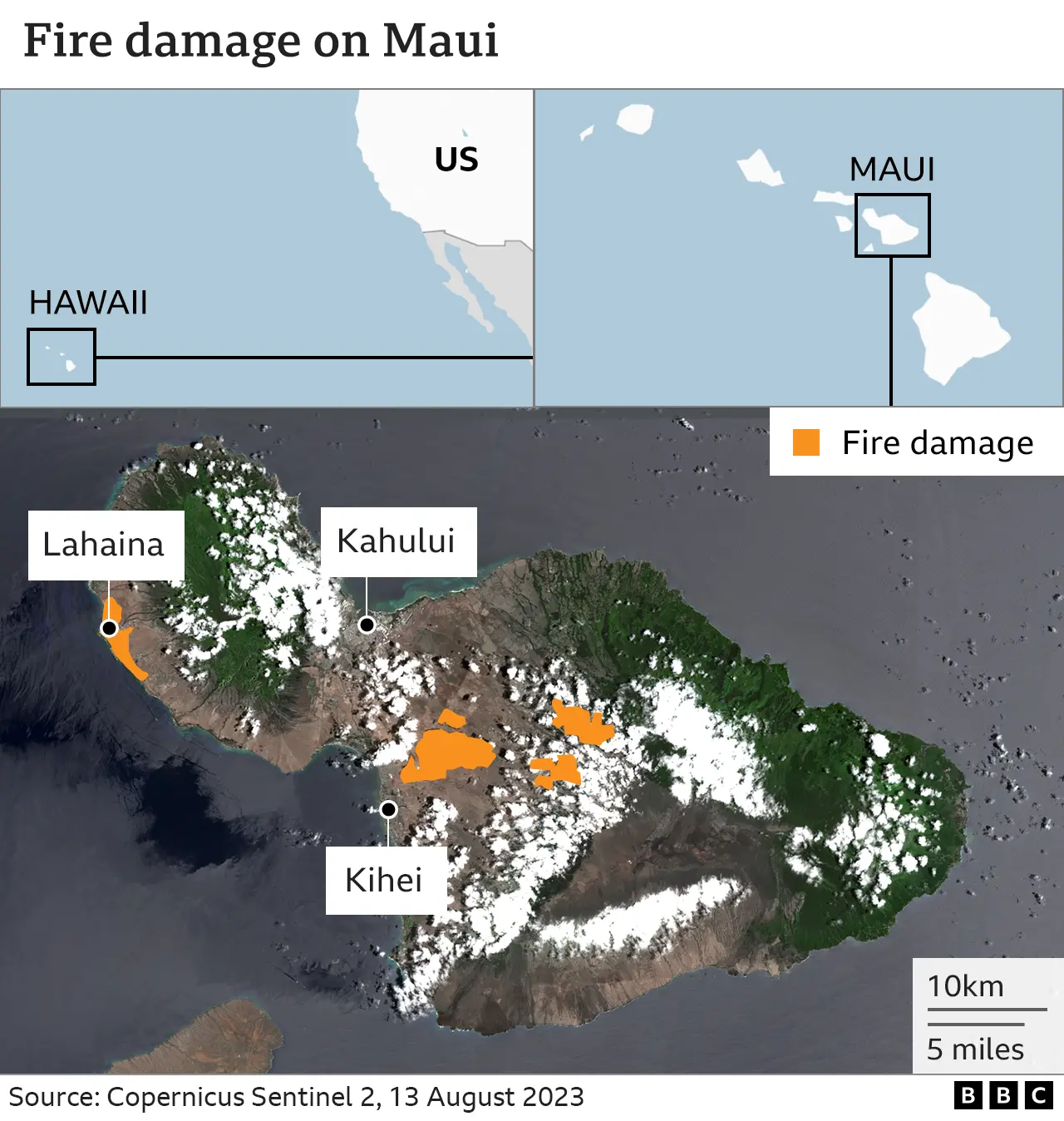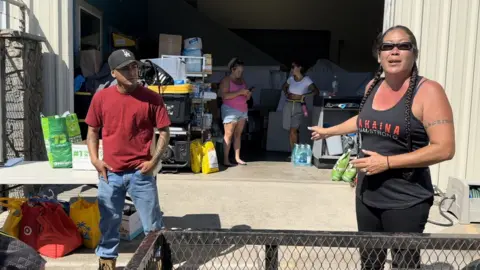Maui fire: 96 killed as governor warns of 'significant' death toll rise
Ninety-six people are known to have died in wildfires on the Hawaiian island of Maui, with officials warning that figure is likely to rise.
Hawaii Governor Josh Green said more than 2,700 buildings had been destroyed in the historic town of Lahaina.
Hundreds of people are still missing and search teams have only covered 3% of the affected area.
"None of us really understand the size of this yet," a visibly emotional Maui Police Chief John Pelletier said.
The local authorities are focusing their efforts on combing through what is left of the coastal area of the island, as work continues to identify victims.
The fires that started on Tuesday would "certainly be the worst natural disaster that Hawaii ever faced", Mr Green warned, adding that the death toll would likely rise "significantly".
Meanwhile, it remains unclear if early warning systems were used or if they malfunctioned, with many people telling the BBC they were not forewarned about the fires.
The state's attorney general is conducting a "comprehensive review" into how the authorities responded.
Representative Jill Tokuda of Hawaii's 2nd congressional district told the BBC World Service's Newshour programme on Sunday that "serious questions" needed to be addressed.
"There's every justification for everyone to feel angry in this particular situation, and we all want answers," Ms Tokuda said.
She also described her visit to Lahaina over the weekend as "heart-breaking", saying that "so many of our families and friends lost everything".
The fires were fuelled by a dry summer and strong winds from a passing hurricane.
Mr Green said gusts from that storm reached speeds of as high as 81mph (130km/h), fanning the flames to travel at one mile per minute and giving people little time to escape.
While the fires are now largely under control, efforts to fully extinguish them are continuing in parts of the island.
Jeremy Greenberg, a senior official at the Federal Emergency Management Agency (FEMA), told the BBC that extra support was being sent included urban search and rescue, and fire suppression teams.
"The absolute number one priority is survivor safety," he said.
Mr Greenberg added that while close to 1,000 people were yet to be contacted, some of these may be safe but out of reach for a number of reasons.
In the emergency shelter at Maui's War Memorial Complex, hundreds of evacuees continued to gather over the weekend, receiving food, toiletries and medical aid from a still-growing number of volunteers.
Large whiteboards noted the most pressing needs - batteries, water, and generators - and an all-caps note that no more clothing was needed.
Keapo Bissen, a member of the War Memorial shelter team, said the list of the missing was fluctuating hour to hour as more people reported absent loved ones, and others were found.
"We've had a lot of great reunions happen in this parking lot," she said. "That's really been the bright side in all of this."

After flying over Maui, helicopter pilot Richard Olsten told the BBC that even most of the boats in the harbour were burnt and had sunk.
"The historic buildings, the church, the missionary building and so forth - all gone.
"The main tourist area where all the shops and restaurants are, the historic Front Street - everything burnt to the ground," he said.

Felicia Johnson, who owns a printing business in the city of Kahului, Maui, is organising a massive grassroots response to the disaster.
Her family is from the Lahaina area. She has amassed hundreds of pounds of donated supplies to bring in, but has been unable to shuttle them through the government checkpoint.
She said that pleading with authorities to let her enter with her donated goods was the hardest part for her emotionally - not the devastation she witnessed while dropping off supplies."That's the part that I'm so wrecked on, is I got to keep begging you to come in to feed people," Ms Johnson said.
She added that many of the docks in the area are too badly damaged or destroyed to bring in supplies by boat. Some people that have made the journey have swum the supplies to the shore.
Some of the young men helping her load supplies blame government mismanagement and bureaucracy.
"Too many chiefs, not enough warriors," said Bradah Young, 25.
"Everybody is in charge but nobody is moving," said another man.
As they departed in hope of being allowed through the checkpoint, one man threw up a shaka, a traditional hand greeting in Hawaii.
